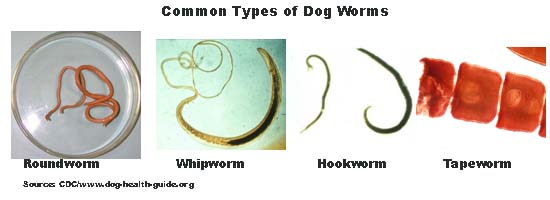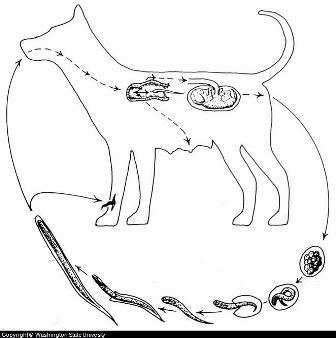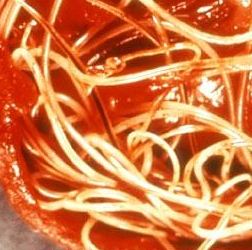Table of Contents
Overview | Types of Worms | How to Identify Worms (description and pictures)
Puppy Worms | Worms in Dog Feces | Roundworms | Whipworms
Hookworms | Tapeworms | Flatworms | Heartworms
Treatment | People & Dog Worms
Ask Our Vet A Question
Summary:
There are two categories of dog worms that can infest your pet:
- Intestinal Worms
- Roundworms (ascarids)
- Tapeworms
- Hookworms
- Whipworms - Non-intestinal Worms
- Heartworms
- Subcutaneous Worms
- Lungworms
- Eye Worms
Most puppies are born with worms which is why deworming is standard treatment. Worms are passed from mother to child internally or through the mother's milk. Worms can also be passed by ingesting feces. Some types of worms are visible in the feces such as roundworms or tapeworms. Tapeworms in particular look like small grains or rice and could be found in the feces or caught in the fur around the anus.
Worms vary in size and how they affect your
dog. A dog with worms should always be
evaluated by a veterinarian, as most are life threatening if left to
multiply and grow into large numbers. There are effective methods
available for preventing a worm infestation with the choice of medication dependent on the dog. Over the counter treatments may not work depending on the type of worm, which is why we recommend a visit to the veterinarian. Treatment involves the use of a dewormer. It will take up to 2 weeks after deworming for worms or eggs to disappear from the feces.
Prevention involves keeping your dog away from areas where worms or their eggs are present in the environment. Some types of worm eggs can last for years in the environment.
Overview
Puppies are always treatment for worms from the age of 2 weeks, then every 14 days up to 2 weeks after weaning. They are treated with fenbendazole/febantel, flubendazole, pyrantel or nitroscanate and then receive monthly treatments up to 6 months of age.
To prevent worms spreading from a pregnant dog to puppies, pregnant females are given macrocyclic lactones on the 40th and 55th day of pregnancy or fenbendazole daily from the 40th day of pregnancy continuing until the 14th day postpartum.
The symptoms and effects of worms varies with the type of worm and degree of infestation.
Digestive tract worms can trigger symptoms ranging from no symptoms (asymptomatic) to dogs that show symptoms such as weight loss, anemia and diarrhea. Dogs with symptoms should visit a veterinarian for a physical examination, parasite tests and a complete medical history.
All digestive tract worms can be spread from one dog to another.
There is also a risk of hookworms and roundworms being transmitted to humans. Most puppies are born with roundworms from the mother while adult dogs contract worms from feces. The one exception is the tapeworm which is spread through an ingested flea. Each type of parasite (another name for worms) has its own characteristics which can be helpful in worm identification.
Most Common Types of Intestinal Dog Worms
As mentioned, there are several types of dog worms which are described below:

Roundworms (also called Nematodes)
Dog roundworms knowns as ascarids are the most common type of worms in dogs, especially puppies. The worms are named after their appearance, which in an adult is like a piece of spaghetti. The worm is spread from dog to dog through the ingestion of contaminated feces, or from a pregnant mother through the placenta to the puppy, resulting in a case of puppy worms. The most important specie is Toxocara canis since it's larvae may migrate to humans as well and also can turn fatal for young puppies.
Roundworms can be transmitted from dogs to humans, which is especially a concern for children.
Whipworms
Dog Whipworms are less common than hookworms or roundworms and are found in colon and cecum, a part of large intestine. They are also transmitted by ingesting contaminated feces and affects both puppies and adult dogs. The parasite can cause severe health problems. The worms attach to a dog's intestinal lining and feed on the host's blood. As the worms multiply in the intestine, they can deplete the blood supply, causing a condition called canine anemia. In puppies in particular, advanced cases can be life threatening. No signs are noticed in light infections but can cause inflammation, weight loss and diarrhea with large numbers. Fresh blood might be seen in faeces in heavy infections.
Hookworms
Dog hookworms are also one of the more common dog worms types. The worm is transmitted via ingested contaminated dog feces are through contact with an open wound or skin crack. Hookworms in dogs infect adults more often, and are less common in puppies, the reverse of what is true for roundworms.

Tapeworms
Dog tapeworms (cestodes, Dipylidium) are common. It is not transmitted through feces like other worms in dogs, but instead is passed through the ingestion of a flea, which carries the immature tapeworm. These dog worms take their name from an appearance, with the worms measuring from 4 to 28 inches in length. As the worm grows in the intestines, segments (proglottids) break off. The infection causes no dog worm symptoms and often goes undetected until the owner notices the small, dried up segments migrating out of the rectum. In advanced cases, there could be some weight loss. These worm segments become caught in the fur surrounding the anus or on the outside of fresh feces and can even be seen crawling on the surface. When the worm segments dry out, it leaves behind small hard yellow eggs that can also be stuck to the dog's fur around the anus.
Tapeworm (dog worms types) is diagnosed during a fecal exam performed in your veterinarian's office. There is minimal risk of the worm being transmitted to humans, although it is possible if a person, particularly a child swallows a flea.
Flatworms
Dog Flatworms (also called Trematodes or Flukes): These dog worms types often hook themselves to your dog in their intestines, lungs and liver. They are also passed when a dog ingests infected feces ,and in infected snails and frogs.
Heartworm
Dog Heartworm: Heartworm disease in dogs (Dirofilaira immitis) occurs when worms grow in and around the heart muscle. The disease is spread when an infected mosquito bites a dog. This is one of the most alarming dog worms types since in advanced stages it is life threatening.
Most infected dogs are asymptomatic for months or years, with heart damage slowing increasing over time. Symptoms of dog heartworm includes moderate to severe coughing, particularly after exercise or when excited. In later stages of the disease the abdomen and legs will swell from fluid accumulation as the right side of the heart suffers from developing congestive failure. Other symptoms when a severe case of the disease is present include difficulty breathing (dyspnea). It is rare for a dog to suddenly die from the disorder. Dog heartworm (dog worms types) infection is diagnosed with a blood test. The test can also indicate the severity of the disease which would point to a specific course of treatment. x-rays can also help to confirm the severity of the disease.

Source: Dr. Richard Wescott/Washington State University
It is difficult to treat heartworm in dogs. Treatment can be risky since killing worms that are already in the arteries and heart can be dangerous. Cases are usually classified from high risk to low risk based on the chance of complications that result from treatment. Low risk or class 1 and 2 dog heartworm cases are characterized by having no symptoms and normal heart x-rays. High risk or class 3, 4, 5 canine heartworm patients are already showing symptoms such as coughing and abdominal swelling.
Dog heart worm treatment
involves symptomatic therapy
to improve heart function and circulation. It is also used to prepare
dogs that are treated with an adulticide that kills the heartworm or
for surgical removal. Most vets will recommend restricted
exercise and cage rest as a way of improving blood circulation.
Anti-inflammatory drugs such as glucocorticosterids (prednisolone) can
also help to control pulmonary inflammation and thromboembolism.
The most commonly used dog heartworm treatment is the
medication
Immiticide (melarsomine hydrochloride) which is injected into the back
muscles of dogs suffering from class 1 - 3 heartworm. A
heartworm
preventative is only used after the heart has been cleared of all
worms.
Luckily, humans cannot be infected by heartworm.
Dog Ringworm (not a worm, a fungal infection)
Note that ringworm is not due to worms, but a skin fungus. It's name is based on an appearance on the skin that looks like a worm.
Symptoms
Many dog owners believe that dogs with normal feces do not have worms. This is not the case. It is also rare for owners to see worms in the dog stool. Dog worms will infrequently have a loose stool or diarrhea. There is nothing about the appearance or consistency of a stool that will indicate if a dog has worms. The reason is that dog worms may remain in the dog while the only thing that is shed are microscopic eggs that cannot be seen with the naked eye. It should be remembered that life-cycle of worms can take days and even weeks, thus even after treatment and recovery; some dogs may act as carriers. There are kinds of worms, where eggs and larvae can survive up to several months in environment.
Many dogs with worms will suffer from conditions such as malabsorption or mild malnutrition, which results in weight loss, even though the dog appears to be eating normally. The loss of nutrients due to malnutrition or malabsorption may also cause a loss of quality in the dog's hair coat. The coat may appear to be unkempt or dull.
Diagnosis
Most of the time, a dog with worms is diagnosed by a veterinarian after studying feces using a flotation technique. The accuracy of the test is increased if fecal samples collected over multiple days are tested. Eggs of roundworms, hookworms, and whipworms are easily identified.
Most veterinarians will check dogs on a regular basis for the different dog worms types by looking for worms in the stool. Dogs are retested approximately 3 weeks after treatment to make sure that worm removal has been successful.
Treatment
Treatment for intestinal parasites generally consists of a broad-spectrum dewormer such as fenbendazole (Panacur®), with the addition of praziquantel (Droncit® or Dog Worms®) if tapeworms are also present. Heartworm can be potentially fatal. Low numbers of worms may not cause symptoms until the condition worsens. If left untreated, the disease can cause heart failure and death. Treating heartworm needs to be a considered decision in order to avoid harming the dog.
Dog Worms and Humans
Most dog worms types are species specific. However, it is possible for humans to get intestinal worms from your dog. The problem is more common in children. For example, children that crawl on the ground or play in sandboxes can ingest the eggs that result in worms.
Hookworms can burrow through human skin and are often found in gulf coast states. In a human a hookworm leaves red spots on the skin that are in a trail (caused by the larvae).
Other dog worms types such as whipworms do not live in humans. The most common type of worms in humans, pinworms, are not found in dogs and cats.
Ask Our Vet A Question or Share Your Story
Have A Dog Worm or Parasite Question For Our Vet? We Will Answer It For Free!
Do you have a Dog Worm or Parasite related Question for our Editors or a Helpful Story to Share? Please include information such as age, sex, breed, medical history, medications your dog is taking, recent changes in behavior, etc. Pictures are also helpful in identifying the severity and cause of any worm or parasite related problems.
We will do our best to get back to you quickly (depends on how many questions we receive each day). If you do require an immediate response we suggest using this online dog veterinary service that is available now.
What Other Visitors Have Asked and Suggestions from our Vet
Click below to see contributions from other visitors to this page...
Worms In Dog Feces 




Reader Question: How do I Treat Worms In Dog Stool?
I found some very small, thread-like worms in one of my dog's poop. I am familiar with tapeworms …
Worm Exiting Dog Penis - Reader Question, Causes and Treatment Options Not rated yet
So my dog, a year-old pitbull, came in from using the restroom and when he laid down I happened to notice something pink sticking out of his penis. Upon …
Reduce Worm Risk in Beagles Not rated yet
What should we treat the ground with inside our lots to help prevent worms in our beagles?
Editor Suggestion - Treating a Dog's Environment to Protect …
Worms and Dog Hip Infection Not rated yet
Can worms cause an infection in my dogs hip? How bad are the worms if its gotten to that point? What can I do to treat them? The worm is short and white …
RoundWorms in Dogs and Kids Not rated yet
We are fostering 2 puppies (6 months and 9 months) from our local shelter who both have round worm. I have found them in their stool as they both are not …
Tapeworms in Puppy Came in Contact With Older Dog - Should We Treat Not rated yet
Our sons new puppy has worms, the little rice looking ones and played with our 8 year old dog, should we treat him for worms now?
Editor Suggestion …
How to Treat Dog Roundworms Not rated yet
Reader Question: How to Treat Dog Roundworms
We have a six week old puppy we took today and had its first shots and wormed. Tonight she has a bit …
Dog Tapeworm Home Treatment Not rated yet
After reading information on this site I am convinced my dog has tapeworm. Can I buy something at the Pet Supply place to get rid of these?
Veterinarian …
Dog Diarrhea After Being Dewormed Not rated yet
Reader Question: What is the Cause of a Watery Pinkish Dog Stool
My 9 week old Cocker Spaniel puppy has been having diarrhea for 2 days after giving …
Puppy Worms Treatment Not rated yet
Reader Question: My daughter has a puppy. He is about two months old. She just noticed a worm come out of his anus. I'm worried. It's late on Friday and …
Causes For Dog Licking Rear End Not rated yet
We just received a rescue dog 4 days ago. Yesterday she started licking her butt a lot. We had her groomed as soon as we got her. I just got back from …
Dog With Worm In Anus Not rated yet
Today while at my boyfriends, I noticed a white (bright white) thing coming out of his husky's anus....it had a pointy tail it wiggled a few seconds on …
Cleaning Yard of Worms From Dogs Not rated yet
Reader Question: How to Clean Dog Worms from Backyard?
Is there something that I can use in my yard to clean any remaining worms or eggs?
Vet …
Dog Vomiting Caused By Parasites Not rated yet
Reader Question: What Types Of Parasites Cause Dog's To Vomit?
What kind of parasite would cause a 6 month old puppy to vomit after drinking or eating? …
Pregnant Dog With Worms Not rated yet
Reader Question: Do you deworm a pregnant dog before giving birth to puppies?
I have a big dog with worms that is about two weeks away from having …
Worms Under Dog Skin Not rated yet
Is there a worm that is just under the surface of a dogs skin? My puppy has a few raised spots all over his back that look like worms.
Vet Suggestion …
References for Dog Worms Types
IVIS – International Veterinary Information Service
Atkins, Clarke E. DVM, Canine Heartworm Disease: Prevention and
Treatment
Heartworm Disease in Dogs; Venco, Luigi
Georgia College of Veterinary Medicine
U.S. Food and Drug Administration

